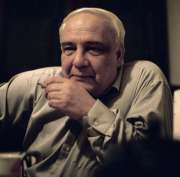|
Биография Vladimir Bukovsky
Disidentul sovietic Vladimir Bukovsky (nascut in 1942) a avut de-a face cu represiunea sovietica inca din scoala (exmatriculat fiind in 1959 pentru ca a editat o revista neautorizata). In 1965 a fost arestat pentru organizarea unei demonstratii in apararea lui Alexander Ginzburg, Yuri Galanskov si a altor disidenti; a fost eliberat in ianuarie 1970. In 1971 a reusit sa trimita in Occident 150 de pagini de documente privind abuzurile din institutiile psihiatrice sovietice.
Impreuna cu Soljenitan si Saharov, Vladimir Bukovski a zguduit comunismul anilor '70 si a devenit, dupa plecarea in Occident, unul dintre cei mai inversunati critici ai sistemului sovietic. In Anglia, unde s-a stabilit, in America, unde si-a luat doctoratul, in Germania si in alte tari, unde a fost tratat de mari sefi de stat ca partener de discutii egal, Bukovski a aparat libertatile si drepturile omului din Est cu disperarea celui ce si-a petrecut in inchisoare doisprezece ani si jumatate.
***
Vladimir Konstantinovich Bukovsky (Russian: Влади́мир Константи́нович Буко́вский; born December 30, 1942) is a notable former Soviet political dissident, author and political activist.
Bukovsky was one of the first to expose the use of psychiatric imprisonment against political prisoners in the Soviet Union. He spent a total of twelve years in Soviet prisons, labor camps and in psikhushkas, forced-treatment psychiatric hospitals used by the regime as special prisons.
Vladimir Bukovsky was born in the town of Belebey, Bashkirian ASSR, Russian SFSR (now Bashkortostan), where his family was evacuated from Moscow during World War II. In 1959 he was expelled from his Moscow school for creating and editing an unauthorized magazine.
From June 1963 to February 1965, Bukovsky was convicted (Article 70-1 of the Penal Code of the RSFSR) and sent to a psikhushka for organizing poetry meetings in the center of Moscow (next to the Mayakovsky monument). The official charge was an attempt to copy anti-Soviet literature, namely The New Class by Milovan Djilas.
In December 1965 he organised a demonstration at Pushkin Square in Moscow in defence of the writers Andrei Sinyavsky and Yuli Daniel (see Sinyavsky-Daniel trial). Three days before the planned demonstration, Bukovsky was arrested. He was kept in various psykhushkas without any charges till July 1966.
In January 1967 he was arrested for organizing a demonstration in defence of Alexander Ginzburg, Yuri Galanskov and other dissidents (Article 190-1, 3 years of imprisonment); released in January 1970.
In 1971, Bukovsky managed to smuggle to the West over 150 pages documenting abuse of psychiatric institutions for political reasons in the Soviet Union. The information galvanized human rights activists worldwide (including inside the country) and was a pretext for his subsequent arrest in the same year. At the trial in January 1972 Bukovsky was accused of slandering the Soviet psychiatry, contacts with foreign journalists and possession and distribution of samizdat (Article 70-1, 7 years of imprisonment plus 5 years in exile).
Together with a fellow inmate in the prison camp No 35 near Perm, psychiatrist Semyon Gluzman, he coauthored A Manual on Psychiatry for Dissidents in order to help other dissidents to fight abuses of the authorities.
Deportation
The fate of Bukovsky and other political prisoners in the Soviet Union, repeatedly brought to attention by Western human rights groups and diplomats, was a cause of embarrassment and irritation for the Soviet authorities.
December 18, 1976, while imprisoned, Bukovsky was exchanged for former Chilean Communist leader Luis Corvalán. In his autobiographical book To Build a Castle, Bukovsky describes how he was brought to Switzerland handcuffed. This biography is available online at several sites.
|





